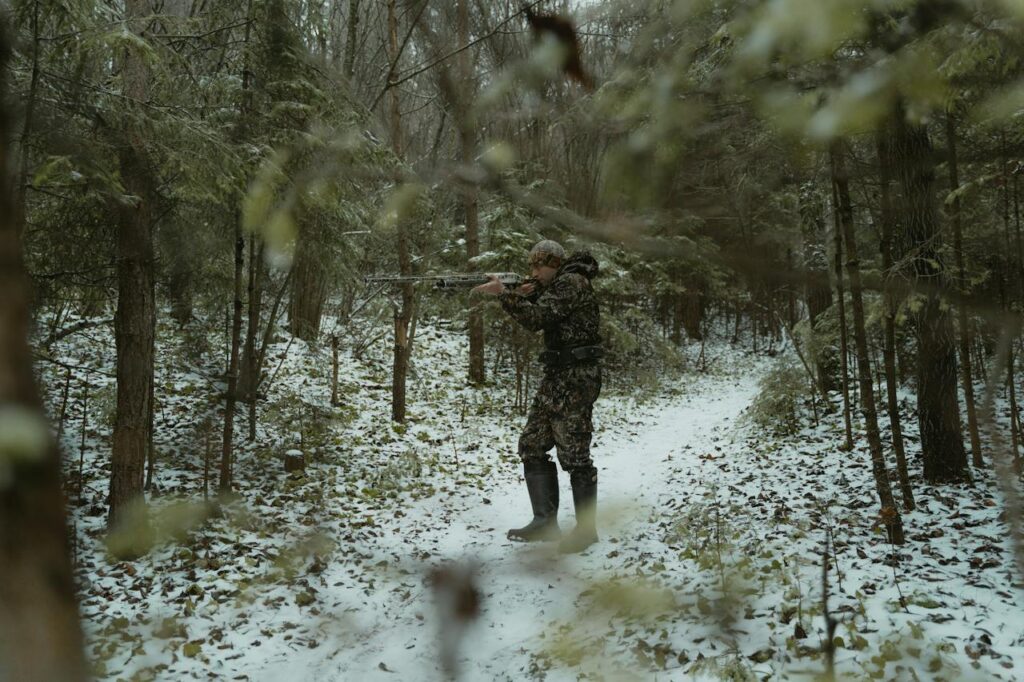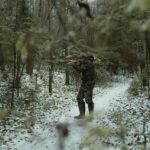Hunting skills are essential for any hunter, whether beginner or veteran. These skills not only improve your chances of a successful hunt, but also enhance your overall hunting experience.
From tracking to marksmanship, honing these skills can make you a better and more effective hunter.
Understanding the importance of hunting skills is crucial for anyone who wants to excel in the world of hunting. These skills are not only about capturing game, but also about responsibility, safety, and knowledge.
By developing these skills, you can become a more responsible and successful hunter.
The evolution of hunting skills has been a part of human history for millions of years. From the early days of hunting for survival to the advancements in technology and techniques, hunting skills have continued to evolve.
Understanding this evolution can provide valuable insight into the significance of these skills in the hunting community.
Check out this Youtube video: “Hunting Skills – YouTube” to learn essential survival skills for foraging and cooking in the wilderness!
The Basics of Hunting Skills
Developing Skills in Tracking and Finding Animals
To excel in tracking and finding animals, it is crucial to understand the art of interpreting animal signs and disturbances in their natural habitat. This involves observing and analyzing clues such as turned over leaf litter, impressions in the ground, broken branches, bent grasses, and more.
Rather than solely relying on blood trails, tracking often involves following a string of disturbances and clues left behind by the animals. Establishing the line of travel is essential, whether by visually inspecting clear tracks or by using popsicle sticks to mark the trail and connect the dots for a better understanding of the animal‘s path.
Keeping a keen eye on the animal’s footsteps and understanding its patterns holds the key to successful tracking ventures.
Retrieval and Recovery Techniques for Hunting
The retrieval and recovery process after a successful hunt is equally significant. A well-placed shot is the foundation for a successful recovery, ensuring a quick, humane death for the animal and minimizing the effort required for retrieval.
It’s imperative to prioritize body care for peak performance in the wild. Employing research-backed recovery strategies, such as proper shot placement and understanding the anatomy of the animal, contributes to a successful retrieval process.
Additionally, utilizing the right tools and equipment, such as knives and ropes, can aid in efficiently recovering and transporting the game.
The Practice of Hunting Skills
Practicing hunting skills involves a multidimensional approach focused on honing physical abilities and enhancing technical expertise. Venturing outdoors to immerse oneself in the habitat of the targeted wildlife is integral to understanding animal behavior and signs that can lead to a successful hunt.
Furthermore, rigorous practice at the shooting range is vital for sharpening marksmanship and safe handling of firearms, bows, or crossbows – key skills for any aspiring hunter. Continuous improvement and refinement of shooting techniques through regular practice sessions are crucial for enhancing accuracy and precision in the field.
Perfecting scouting techniques and marksmanship is fundamental to evolving into a proficient and responsible hunter.
| Animal Tracking Techniques | Description |
|---|---|
| Observing animal signs | Analyzing clues such as turned over leaf litter, broken branches, and more |
| Establishing the line of travel | Using popsicle sticks to mark tracks or visually inspecting clear tracks |
| Recovery Strategies | Prioritizing body care for peak performance in the wild, achieving a swift recovery process |
| Shot Placement | Ensuring a well-placed shot for a quick death and easy retrieval |
| Practicing Marksmanship | Regularly honing shooting skills and safe handling of firearms |
Essential Skills Every Hunter Should Know
Organization for Successful Hunting
When it comes to organization for successful hunting, it is crucial to ensure that your hunting pack is efficiently packed with all the necessary gear and supplies. Prioritize placing lightweight, unbreakable, and bulky items at the bottom of the pack to provide a stable base and prevent discomfort during long treks. Essential items such as first aid kits, water, and a map or compass should be easily accessible for quick use in case of emergencies.
In addition to this, a well-organized hunting pack also comprises the proper storage of food and water. Packaging food in Ziploc bags not only saves space but also prevents any leaks or spills inside the pack. Hydration is critical for sustained energy during the hunt, so having a hydration system or water bottles in easily accessible pockets is vital.
Another aspect of successful hunting organization is the segregation of gear into different compartments. This facilitates easy access to tools such as knives, a flashlight, or spare ammunition without having to dig through the entire pack.
Finally, integrating a system for waste management through the use of compact trash bags helps in maintaining a clean and environmentally aware hunting area.
| Lightweight, essential items at the bottom | Proper food and water storage | Compartmentalizing gear | Waste management |
|---|---|---|---|
| Ensures stability and comfort | Prevents spills and saves space | Facilitates easy access | Promotes environmental conservation |
Planning for a Successful Hunt
Planning for a successful hunt involves a comprehensive set of steps to ensure that the experience is not only enjoyable but also productive. It starts with conducting thorough research about the target game species, their habits, and the environment in which they thrive. Understanding the habits and patterns of the prey allows for a more targeted and effective hunting approach.
Furthermore, having a detailed checklist of essential gear, permits, and licenses keeps hunters prepared for any situation and ensures compliance with hunting regulations. It is also advisable to identify potential hunting spots, either through personal scouting or by seeking advice from experienced hunters or local wildlife authorities.
Utilizing advanced technologies like GPS and satellite imagery allows hunters to pinpoint potential game-filled areas and navigate terrain more efficiently.
Completing the planning phase with an evaluation of potential risks, such as weather conditions, wildlife encounters, and physical readiness, is critical for a safe and successful hunt. Meticulous planning sets the stage for an organized and purposeful hunting expedition.
Navigation Techniques for Hunting
Navigation techniques for hunting are integral for successful game tracking and ensuring the safety of the hunting party. Familiarizing oneself with topographic maps, landmarks, and using compasses aids in accurate navigation through varied terrains. Prior to the hunt, it is crucial to mark potential hunting areas and establish routes through the use of GPS devices.
Additionally, understanding celestial navigation by using the sun, moon, and stars can serve as a reliable backup when modern navigation tools are unavailable. Ensuring that all hunting members are equipped with navigation skills and have the necessary tools can prevent getting lost or disoriented, especially in unfamiliar wilderness areas.
In essence, mastering navigation techniques not only enhances the hunting experience but also serves as a safety precaution against unforeseen circumstances during the hunt.
Using Camouflage Effectively in Hunting
Using camouflage effectively in hunting involves employing techniques and gear to blend seamlessly with the environment and remain undetected by prey. The right choice of camouflage patterns and colors that match the natural surroundings aids in breaking the hunter’s outline and remaining inconspicuous to the game.
Aside from clothing, modern hunting gear such as blinds, decoys, and scent control products play a pivotal role in ensuring that the hunter’s presence remains undetected. Utilizing scent-masking sprays and applying smart wind strategies help in approaching animals without alerting them to the hunter’s presence.
Moreover, understanding the principles of light and shadow can aid in positioning oneself effectively for ambushes or stalks. Good use of natural cover and staying aware of noise and movement minimizes the chances of being spotted, thus increasing the likelihood of a successful encounter with prey.
Precision in Hunting for Optimal Results
Precision in hunting is crucial for achieving the desired results without causing unnecessary harm to the ecosystem or the prey. When identifying a target, the ability to assess the distance accurately and make clean shots is fundamental.
This necessitates regular practice with firearms or bows to maintain shooting proficiency and ensure ethical hunting practices.
Moreover, understanding the anatomy of the target species is vital in identifying the most effective point of aim for a quick and humane kill. Additionally, incorporating the use of optics such as rangefinders and scopes enhances accuracy and ethical hunting practices.
Maintaining precision in hunting is not only about successfully bagging the game but also about respecting wildlife and the environment by minimizing suffering and ensuring the conservation of natural resources.
Hunter Safety and First Aid Skills for Hunters
Prioritizing hunter safety and first aid skills is essential for any hunting expedition. This includes understanding and following firearm safety rules, wilderness first aid, and CPR. Additionally, hunters should be proficient in basic first aid procedures such as wound care, splinting, and addressing environmental emergencies.
Training in the use of emergency signaling devices, like whistles or signal mirrors, also plays a crucial role in ensuring that hunters can call for help if the need arises. Equipping oneself with a well-stocked first aid kit tailored for hunting-related injuries, including tools for handling potential gunshot wounds, is imperative for preparedness.
Furthermore, taking steps to prevent mishaps such as ensuring proper firearm handling, dressing appropriately for hunting conditions, and notifying someone of the hunting plan and location contributes significantly to hunter safety. A proactive approach to safety and first aid skills can prevent accidents and ensure a safe return from the hunt.
The Importance of Determination in Hunting
The importance of determination in hunting cannot be overstated, given the unpredictable and challenging nature of the activity. Remaining resolute in the face of adversity, unpredictable weather, and unfavorable hunting conditions is crucial for a successful hunt.
Moreover, sustaining motivation and focus during extended hunting trips, especially during moments of slow activity, demands true determination. It is the relentless pursuit of the objective that often leads to the most rewarding hunting experiences.
Adaptability, perseverance, and maintaining a positive mindset are essential for overcoming obstacles and setbacks encountered during hunting expeditions.
Determination is what sets successful hunters apart, enabling them to navigate the uncertainties of the wilderness and emerge victorious in achieving their hunting goals.
Developing Advanced Hunting Skills
Bushcraft Skills for Hunting
When it comes to mastering the art of hunting, bushcraft skills play a crucial role in ensuring success. It involves honing abilities to navigate and survive in the wilderness. Some essential bushcraft skills for hunting include shelter-building, fire-starting, water sourcing, foraging, and tracking. These skills enable hunters to adapt to various environmental conditions and increase their chances of a successful hunt.
Another important aspect of bushcraft skills for hunting is the knowledge of wildlife behavior and habitat identification. Understanding how animals move and where they seek refuge is vital for anticipating their actions and planning the hunt accordingly. Furthermore, mastering traditional hunting techniques such as bow-making and primitive hunting methods adds a deeper dimension to one’s hunting prowess.
In addition to these fundamental skills, advanced bushcraft involves mastering silence and stealth in the wild, allowing hunters to stalk and approach their prey without detection. Honing bushcraft skills is integral to becoming a well-rounded and efficient hunter.
Patience as a Key Hunting Skill
Patience is not just a virtue; it’s a critical skill for hunters pursuing their prey in the wild. A successful hunt often hinges on waiting for the right moment to make a move. Patience allows hunters to observe their surroundings, analyze animal behavior, and choose the opportune time to make their move.
Furthermore, mastering patience enables hunters to remain calm and focused during prolonged periods of waiting, thereby maximizing their chances of success. It’s the ability to endure the uncertainties of the hunt and remain dedicated to the pursuit that sets apart skilled hunters from the rest.
Developing patience as a key hunting skill also involves understanding the value of resilience and persistence in the face of adversity. Whether facing inclement weather conditions or encountering unforeseen challenges, patient hunters remain steadfast in their pursuit of their target.
Acquiring Woodsmanship Skills
Acquiring woodsmanship skills forms the bedrock of a hunter’s ability to navigate and adapt to the forest environment. This encompasses knowledge of various tree species, including their uses for sustenance, shelter, and tool-making. Additionally, understanding different types of terrain and how to navigate through dense foliage and rugged landscapes is essential for successful hunting ventures.
Moreover, understanding animal signs and tracks within the forest is crucial for hunters to interpret wildlife movement and anticipate game patterns. Mastering the art of reading the forest not only equips hunters with the necessary skills to locate their prey but also ensures a deeper connection with the natural world.
Woodsmanship skills also encompass proficiency in outdoor survival, including the ability to build shelter, identify edible plants, and source clean water. These skills are indispensable for ensuring the hunter’s safety and well-being during extended periods in the wilderness.
Ethics and Good Woodsmanship in Hunting
Hunting ethics and good woodsmanship are inherent to responsible hunting practices. Ethical hunting entails respecting wildlife, adhering to legal regulations, and promoting conservation efforts. Hunters must prioritize sustainability and ecological balance, ensuring that their activities do not jeopardize the natural habitats of wildlife species.
Moreover, good woodsmanship involves leaving minimal impact on the environment and practicing leave-no-trace principles. This includes responsibly disposing of waste, preserving natural habitats, and minimizing disturbance to the flora and fauna. Good woodsmanship also extends to fostering a sense of stewardship for the environment, actively participating in habitat restoration and conservation initiatives.
Developing advanced hunting skills goes beyond firearms proficiency and includes honing bushcraft, patience, woodsmanship, and upholding ethical standards. By embracing these facets, hunters can foster a deeper connection with nature while promoting sustainable and mindful hunting practices.
Recommended Amazon Products for Hunting Skills
Here’s a curated list of products that can help you develop your hunting skills with ease. These recommendations are based on functionality, quality, and reviews.
Bushnell Trophy Cam HD Trail Camera
The Bushnell Trophy Cam HD Trail Camera is an essential tool for developing skills in tracking and finding animals. With its high-quality image and video capture, this camera is perfect for monitoring game activity and improving your hunting techniques. Check out the Bushnell Trophy Cam HD Trail Camera today to enhance your hunting skills!
Outdoor Edge WildLite Knife and Game Processing Kit
The Outdoor Edge WildLite Knife and Game Processing Kit is an ideal choice for retrieval and recovery techniques for hunting. This complete set includes all the tools you need to field dress and process game effectively. Its high-quality construction and ergonomic design make it a must-have for hunters. Check out the Outdoor Edge WildLite Knife and Game Processing Kit to improve your hunting experience!
Stealth Operator Compact Binoculars
The Stealth Operator Compact Binoculars are an excellent option for precision in hunting for optimal results. These high-performance binoculars provide exceptional clarity and accuracy, allowing you to scout and spot game with ease. With their durable construction and compact design, these binoculars are perfect for the avid hunter. Check out the Stealth Operator Compact Binoculars to elevate your hunting skills!
Primos Stretch-Fit Gloves
The Primos Stretch-Fit Gloves are an essential hunting accessory for precision and organization. These gloves provide a comfortable and snug fit, allowing you to handle your gear and equipment with ease. With their durable and flexible design, these gloves are perfect for all hunting conditions. Check out the Primos Stretch-Fit Gloves to enhance your hunting experience!
ALPS OutdoorZ Pack
The ALPS OutdoorZ Pack is perfect for organization and planning for a successful hunt. With its ample storage and durable construction, this pack allows you to carry all your hunting essentials comfortably and securely. The pack’s ergonomic design and versatile features make it an indispensable accessory for hunters. Check out the ALPS OutdoorZ Pack for an improved hunting experience!
Top Recommended Product for Hunting Skills
If you’re looking for the best solution to improve your hunting skills, we highly recommend the Bushnell Trophy Cam HD Trail Camera. Here’s why:
| Pros | Cons |
|---|---|
| High-quality image and video capture | Requires additional batteries |
| Ideal for monitoring game activity | Setup may be time-consuming |
| Durable and weatherproof construction | SD card not included |
Ready to develop your hunting skills? Check out the Bushnell Trophy Cam HD Trail Camera today for the best results!
Frequently Asked Questions
What skills are needed for hunting?
What Skills should a Hunter have?
What is the most important skill for a hunter to learn?
What every hunter should know?
What is the hardest deer to hunt in the world?
Reference Links
- https://www.linkedin.com/pulse/hunting-ciso-visualize-your-advanced-skills-using-paul-huijbregts
- https://learn.microsoft.com/en-us/microsoft-365/security/defender/advanced-hunting-overview?view=o365-worldwide
- https://www.britannica.com/sports/hunting-sport
- https://outdooraction.princeton.edu/nature/guide-animal-tracking
- https://www.history.com/topics/pre-history/hunter-gatherers







